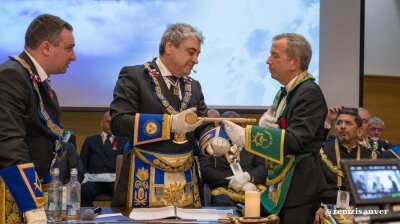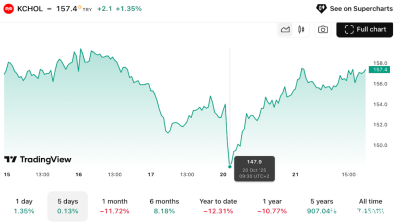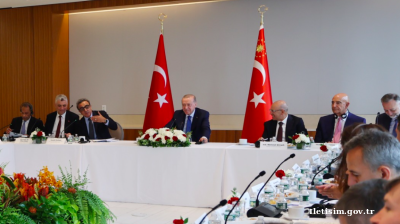Northern Cyprus’ new president Tufan Erhurman is not an opponent of the Turkish government, according to Abdullah Korkmazhan, an academic at Near East University in Nicosia.
Korkmazhan, bianet reported on October 20, said it would not be correct to regard Erhurman in the same way as Mustafa Akinci, the 2020 presidential candidate known for his anti-Ankara views.
In the second round of the Northern Cypriot election held on October 19, Erhurman humiliated his rival, Ersin Tatar, attracting 63% of the vote. As many as 65% of the 218,313 registered voters participated in the second, decisive round of the contest.
Northern Cyprus is home to around 0.4mn citizens. Making inferences about Turkey, which has around 60mn registered voters, on the basis of the election outcome in Northern Cyprus could be seen as rather wishful thinking.
Aristotle’s logic does not hold
Incumbent president Tatar, who took 36% of the vote, is an open ally of Turkey’s long-ruling president, Recep Tayyip Erdogan, and his junior coalition partner Devlet Bahceli, who heads the Nationalist Movement Party (MHP).
So Aristotle’s logic reasons that if Tatar is an Erdogan ally and Erhurman is Tatar’s rival, then Erhurman is an opponent of Erdogan. Korkmazhan explains that the reality does not fit this model.
Erhurman is no Mustafa Akinci
“It’s important not to equate Erhurman with Mustafa Akinci,” Korkmazhan told the Turkish publication.
In the previous presidential election held in 2020, Akinci was defeated by Tatar, who attracted 51.7% of votes cast in the second round versus Akinci’s 48.3%.
Akinci adopted a clear ideological and political stance against Turkey’s ruling administration, according to the academic. He supported a federal solution to the issue of the divided island of Cyprus and opposed the imposition of Islamist policies by Turkey’s governing Justice and Development Party (AKP) on Turkish Cypriots, Erhurman noted.
Paramilitary groups did not tangle with Erhurman
“As a result, during the 2020 election, [Akinci] faced threats from paramilitary groups, received death threats and was labelled a ‘traitor’ by both the AKP and MHP,” he added.
“Back then, armed groups reportedly went door to door across villages, pressuring voters in a highly intrusive campaign,” he also recalled.
Erhurman’s situation is very different, according to Korkmazhan. He pointed out that the AKP and MHP anticipated that he would not pose a major threat should he win the election because he operates within a more conciliatory, non-confrontational political line that maintains dialogue and cooperation with Turkey.
Word “federation” never mouthed
The international media response to Erhurman’s victory is generally very wide of the mark. The message circulated is that Erdogan has “lost” the election in Northern Cyprus and will face an Erhurman who will push for the island to come under a federation, a far cry from Tatar’s agenda that would see an annexation by Turkey.
In fact, during his election campaign, Erhurman never explicitly mouthed the word “federation”, said Korkmazhan, adding that he nevertheless expects the new president to revive the push for “talks” in contrast to the Tatar “no talks” stance that has held sway for five years. The course of any talks would, however, depend on the state of the powerplay conducted by the global and regional actors in the affairs of the Middle East and Eastern Mediterranean.
“If Turkey’s ruling power insists on a two-state solution, negotiations on Cyprus will not begin. Erhurman’s next steps remain uncertain in this regard,” Korkmazhan said.
Erdogan’s indirect support
Erhurman’s approach should not be conflated with Akinci’s ideological and political resistance to the Erdogan regime in Turkey, according to the academic.
His political strategy has been to avoid irritating Turkey’s powers that be and to quietly gain their indirect support.
Those who voted for Erhurman previously backed Akinci
However, the majority of those who voted for Erhurman were actually the same voters who supported Akinci; in other words, those who were and are uncomfortable with Turkey’s policies.
Ankara’s interference eased after Erdogan-Trump meeting
When asked whether Turkey was unable to interfere in the election, Korkmazhan said that the level of Turkish interference noticeably declined following a meeting held on September 25 between Erdogan and his American counterpart Donald Trump at the White House.
Just as Turkey softened its hardline stance in Syria following that meeting, taking a different view of agreements between the Kurdish-dominated Syrian Democratic Forces (SDF) and the Damascus regime, it’s possible that post-Gaza peace efforts and expectations about Israel have also influenced its Cyprus policy, according to Korkmazhan.
Following the meeting, Turkey’s ruling bloc appeared to back away from its usual interventionist approach in Cyprus to instead let events take their course. As a result, there was no prevention of Erhurman’s victory, Korkmazhan also observed.
“Of course, they could have blocked it [the victory] if they had wanted, though that’s a debatable issue. There was already intense public opposition to Ersin Tatar, and it was clear he was widely unwelcome [to stay as president],” he also said.
Type of poll fixing seen in Turkey not used in Northern Cyprus election
Erdogan’s ex-interior minister Suleyman Soylu, his last PM Binali Yildirim along with Umit Ozdag, head of the far-right Victory Party, regularly visited Tatar during his campaign, according to Korkmazhan.
“But if the same level of intervention as in 2020 had occurred, with a similarity to how the Turkish government acts in its own elections or appoints trustees [to opposition-controlled municipalities it wants to gain control of], could something similar have happened here? Yes, it could have,” he added.
Democracy and self-governance “nothing more than illusions”
“After all, Northern Cyprus is effectively controlled by those in power in Turkey, by its government and state institutions. Claims that the Turkish Cypriots govern themselves and enjoy democracy are nothing more than illusions,” contended Korkmazhan.
Good cop, bad cop
When asked about Bahceli’s bitter statements about the election result in Northern Cyprus compared to Erdogan’s extended hand to Erhurman, Korkmazhan posed some questions: “Could there have been a hidden balance or strategy within the [Turkish] ruling alliance when it comes to the Cyprus issue? Was Erhurman quietly allowed to win while the MHP was left alone to support Ersin Tatar on the ground?”
No mobilised intelligence agents
These are questions worth asking, according to the academic, who also took note of how the Turkish Cypriots did not see the AKP engaging in direct intervention in the grass roots of the election, with no house-to-house campaigning and no mobilised intelligence agents or MPs – unlike in 2020.
“So, once it became clear that Erhurman was going to win, it seems the process was left to run its course,” he assessed.
Magnet for Turkish organised crime
Given that a clear legal status does not hold on both sides of the island, the Cypriots suffer from the growing interest of Turkish and international organised crime.
Cyprus has become a centre for human trafficking, arms and drug smuggling and money laundering, according to Korkmazhan.
“People here have lived in fear for a long time. Even while simply driving around, you could be killed. And these aren’t just local problems, they’re criminal networks imported from Turkey,” he concluded.
Opinion

COMMENT: Hungary’s investment slump shows signs of bottoming, but EU tensions still cast a long shadow
Hungary’s economy has fallen behind its Central European peers in recent years, and the root of this underperformance lies in a sharp and protracted collapse in investment. But a possible change of government next year could change things.

IMF: Global economic outlook shows modest change amid policy shifts and complex forces
Dialing down uncertainty, reducing vulnerabilities, and investing in innovation can help deliver durable economic gains.

COMMENT: China’s new export controls are narrower than first appears
A closer inspection suggests that the scope of China’s new controls on rare earths is narrower than many had initially feared. But they still give officials plenty of leverage over global supply chains, according to Capital Economics.

BEYOND THE BOSPORUS: Consumed by the Donald Trump Gaza Show? You’d do well to remember the Erdogan Episode
Nature of Turkey-US relations has become transparent under an American president who doesn’t deign to care what people think.




